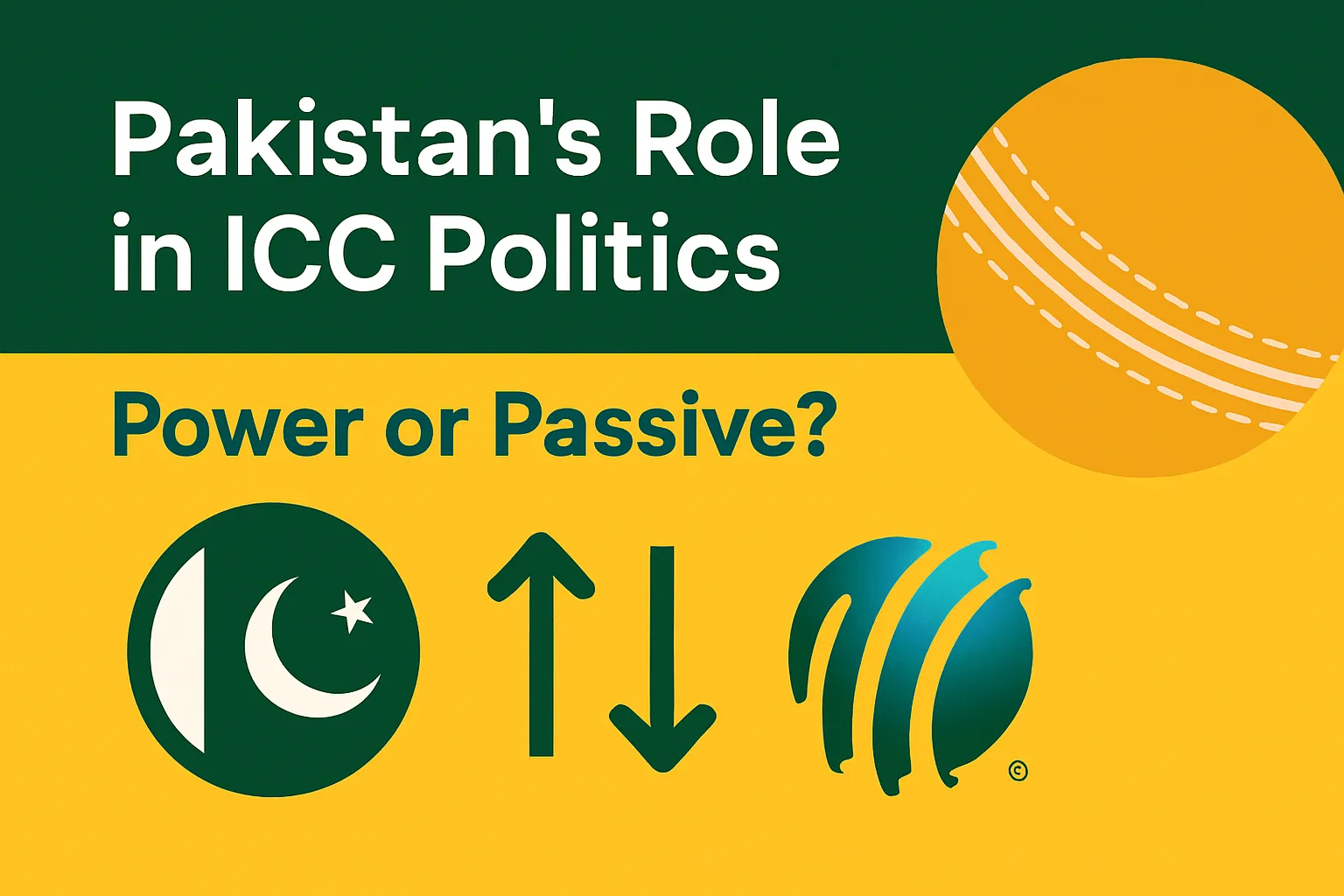Introduction
In the world of cricket, Pakistan’s influence within the International Cricket Council (ICC) has often been a subject of debate. Over the years, Pakistan has oscillated between being a powerful player on the global stage and being considered passive in the decision-making processes that shape the future of the sport. So, is Pakistan a key player in ICC politics, or does it merely follow the decisions made by the more dominant cricketing nations? In this article, we will examine Pakistan’s role in ICC politics, exploring its contributions, influence, and challenges within the global cricket governance system.
The Significance of the ICC
The International Cricket Council is the global governing body for cricket, responsible for overseeing the rules of the game, organizing international tournaments, and ensuring fair play among its members. The ICC’s decisions significantly impact the structure of international cricket, and its politics play a significant substantial role in shaping the game’s future.
Pakistan’s Historical Impact on ICC Politics
Historically, Pakistan has had a strong influence on ICC decisions. In the 1980s and 1990s, Pakistan was an active participant in ICC politics, playing a significant role in the global development of the sport. With the backing of countries like India, Pakistan’s stance on some issues helped shape key decisions, including the structure of the World Cup and the introduction of the ICC Champions Trophy.
Pakistan’s Contribution to the Growth of Cricket
One of Pakistan’s most significant contributions to the ICC is its role in popularizing cricket in the subcontinent and around the world. The Pakistani team’s consistent performances in international tournaments have showcased the country’s ability to produce world-class cricketers. Furthermore, Pakistan’s commitment to developing cricketing infrastructure in smaller, emerging nations has been crucial in spreading the sport globally.

The Power Struggle within the ICC
ICC politics, much like any other global sports governing body, is subject to power struggles. The most powerful cricketing nations—India, Australia, and England—have long dominated decision-making processes within the ICC. Pakistan’s influence, though considerable, is often overshadowed by the financial and logistical power wielded by these cricketing giants. Despite this, Pakistan continues to play a role in key decisions, particularly those relating to tournament structures and bilateral agreements.
Pakistan’s Strategic Alliances in ICC
While Pakistan may not always have the financial clout to dominate ICC politics, it has managed to form strategic alliances with other cricketing nations, particularly in the subcontinent. Pakistan’s relationship with India, though complicated by political tensions, has historically been a significant factor in shaping decisions related to the sport in the region. Additionally, Pakistan has often teamed up with other smaller cricketing nations to challenge the dominance of the so-called “big three” (India, Australia, and England).
Pakistan’s Passive Role in Recent Years
In recent years, some critics have argued that Pakistan has taken a more passive approach to ICC politics. With the rise of the big three, Pakistan has found itself sidelined in many meaningful discussions. The 2014 revamp of the ICC governance model, which granted more power to the Big Three, has been seen as a turning point for Pakistan’s influence within the organization. This restructuring left Pakistan in a relatively weaker position, as decisions that directly affected the global cricketing community were increasingly made without its input.
Challenges Faced by Pakistan in ICC Politics
Pakistan faces several challenges in asserting its power in ICC politics. One of the key challenges is the country’s financial limitations, which restrict its ability to lobby effectively within the ICC. Additionally, Pakistan’s political instability and security concerns have led to a decline in its role in international cricket. The absence of top-tier international teams touring Pakistan due to security issues has further weakened the country’s standing within the ICC.
The Future of Pakistan’s Role in ICC Politics
Pakistan’s role in ICC politics may hinge on its ability to adapt to changing circumstances. With the rise of new cricketing nations and growing concerns about the monopolization of power by the big three, Pakistan may have an opportunity to strengthen its position. By focusing on building alliances with other nations and continuing to develop its cricketing infrastructure, Pakistan can ensure that its voice remains a significant presence in ICC decision-making processes.
Conclusion
Pakistan has played a significant role in ICC politics in the past. Still, its influence has been diluted in recent years due to structural changes within the governing body and shifting global dynamics. While Pakistan may not currently hold the same level of influence as the dominant cricketing nations, it remains a key player in shaping the sport’s future. The question of whether Pakistan is passive or assertive in ICC politics remains complex, and its future in this arena will depend on its ability to adapt to an ever-changing global cricket landscape.
FAQs
What is the ICC, and why is it essential for cricket?
The ICC is the governing body for cricket worldwide. It oversees international cricket events, ensures fair play, and sets the rules of the game.
How has Pakistan historically influenced ICC politics?
Pakistan has played a key role in shaping major ICC decisions, including tournament formats and the development of the sport in emerging nations.
Why has Pakistan’s role in ICC politics diminished in recent years?
The 2014 restructuring of the ICC, which favoured the financial and political power of the big three, diminished Pakistan’s influence in decision-making.
What challenges does Pakistan face in ICC politics?
Pakistan faces financial limitations, political instability, and security concerns that have affected its ability to play a central role in ICC decisions.
What can Pakistan do to regain influence in ICC politics?
By building stronger alliances with other cricketing nations and focusing on domestic cricket development, Pakistan can enhance its role in global cricket governance.